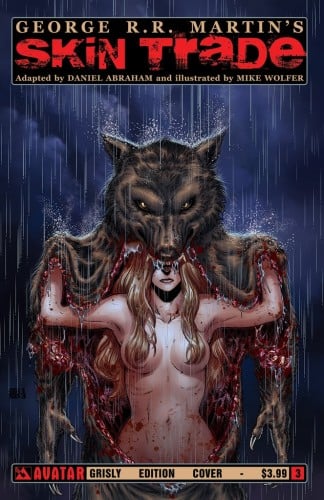Westeros
The 'A Song of Ice and Fire' Domain
News
Last week, it was reported that George R.R. Martin has filed suit in the Los Angeles Superior Court against Blackstone Manor, LLC, the company that holds the rights to producing “The Skin Trade”, his award-winning 1988 horror novella. According to reports of the suit, it’s alleged that on the day before its option lapsed, Blackstone Manor threw together a skeleton crew and filmed “a few scenes” to try and claim rights to “The Skin Trade” in perpetuity, an act which Martin’s lawyers suggest is tantamount to an “artifice”, a “token production” insufficient to retain the rights.
There’s a long history of companies doing things like this (called “ashcans” by some) to hold on to rights. The most remarkable is Black Bart, four fully-produced seasons of a Blazing Saddles-spinoff TV show that was never aired solely so that the studio could hold on to the right to film a sequel to the hit comedy. Accusations flew that the Roger Corman-produced Fantastic Four film was also filmed simply to hold on to the rights, though the rights-holder denied it at the time and his denial seemed to be confirmed by Marvel’s CEO at the time. Much more recently—and more saliently, in a lot of ways—was Red Eagle Entertainment throwing together Winter Dragon, a 22 minute “pilot” aired at 1:30 AM on FXX in a paid promotion time slot to attempt to hold on to the rights to Robert Jordan’s Wheel of Time.
In all three of these cases, these various efforts seemed to succeed in the companies in question retaining some stake in the rights to the projects: Warner Bros. continued to pay CBS to make Black Bart until they ultimately decided to pass on any plans to make a Blazing Saddles sequel, film producer Bernd Eichinger retained a stake in The Fantastic Four film and its sequel that were made by Fox, and Red Eagle Entertainment settled with Robert Jordan’s estate out of court and according to reports retains a financial stake in the Amazon Prime Wheel of Time series currently in production. This may not bode well for the lawsuit, although unlike those Martin’s lawyers are alleging that the “artifice” is so blatant that not even a complete product was filmed.
“The Skin Trade”, which won the World Fantasy Award for Best Novella in 1989, was written during GRRM’s period working in Hollywood, and the influence of Hollywood can be seen in the novella, presaging some of the same techniques and approaches that would make A Song of Ice and Fire such a success. In fact, Avatar Press published a comic book adaptation (written by author Daniel Abraham, who also adapted Fevre Dream for Avatar). Back in 2009, Mike the Pike Productions—run by a Mark. B. Newbauer—struck an agreement with Martin to option the work. Mike the Pike attempted to find interest in the project, creating a pitch (PDF file) for it, and in 2015 Martin announced that Cinemax (sister company to HBO, and doubtless interested in part due to Martin’s overall deal with the parent company) had ordered a script. It now seems clear that Cinemax did not go further than that, but it seems to be the closest the Mike the Pike-headed project has ever come to being produced… that is, until this apparent attempt to hold the rights by filming
One note we’ll added is that according to the reports, Blackstone Manor, LLC (which appears to be registered in Delaware but seems to have an office in Los Angeles) was assigned the rights, suggesting to some that the company is a separate entity that Mike the Pike sold the rights to. Looking at recent press releases related to Mike the Pike Entertainment (the company briefly renamed itself when it was aquired by VGTel, but a year later Mike the Pike and VGTel parted ways), the company still very much touts “The Skin Trade” as being part of its IP portfolio. This leads us to believe that Blackstone Manor, LLC is a special purpose vehicle (“SPV”) of Mike the Pike Productions, created to hold and exploit the rights to “The Skin Trade”. SPVs are a common way for companies to separately develop and seek investors for projects, as projects can be financially isolated from one another.
Tags:
George R.R. Martin • Other Books and Projects • Licensed Products | PermaLink
